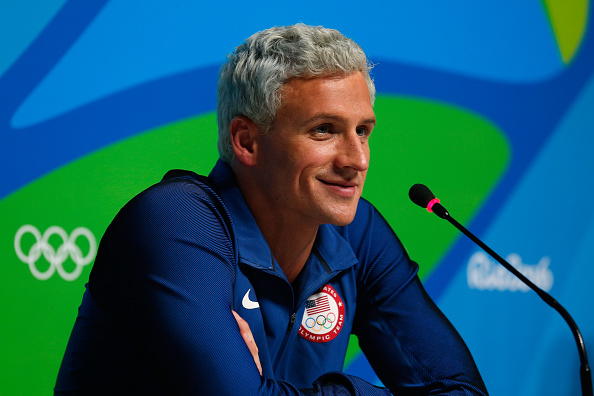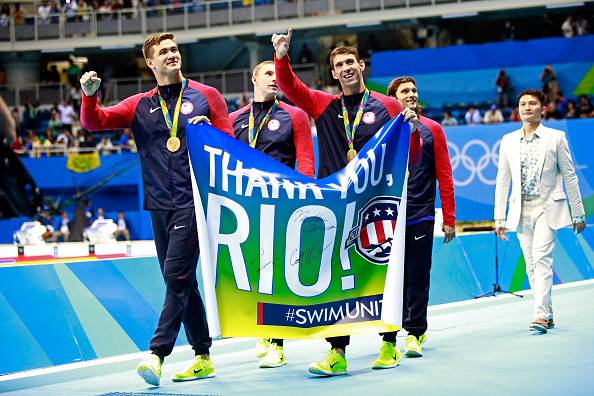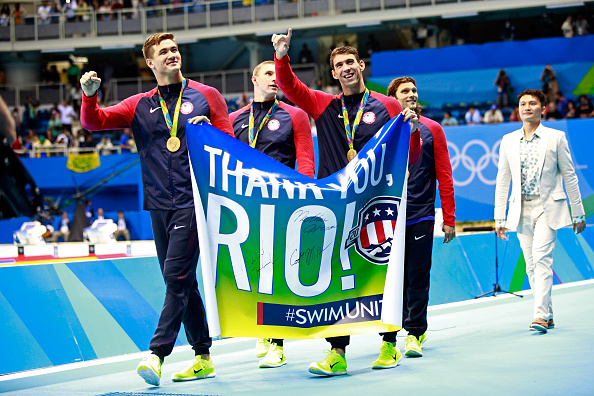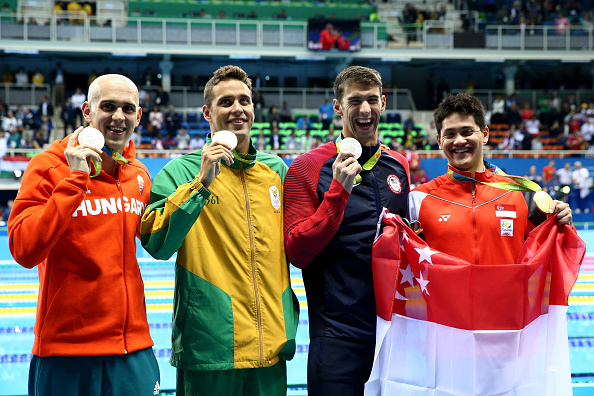Something is seriously amiss in our cultural — indeed, our moral and ethical — landscape if Ryan Lochte’s next move turns out to be a starring turn on “Dancing with the Stars.”
The producers of DWTS must be themselves dancing with glee over this publicity coup. Everyone loves a train wreck. Who wouldn’t tune in?
Reports emerged Wednesday that Lochte would appear on the show. He was said to have struck a deal to appear on DWTS before Lochtegate — that is, his purported robbery tale and its twists and turns at the just-concluded Rio Games.

Everybody has a right to make a living and, goodness knows, Lochte may be in need of cash flow after four sponsors ditched him on Monday.
But that’s not the only interest that is crying out here to be served.
Indeed, here is the one that seems way more important than ratings. Heresy, some will say, but here goes:
How is it that a guy who “over-exaggerates,” to use his phrasing, gets to revel in a network-TV spotlight when he, whether intentionally or not, cut and run in the aftermath of whatever it is that happened at that Rio gas station, leaving his three much-younger teammates to fend for themselves with the Brazilian authorities while he, details of the story changing with different tellings, was already back in the States?
Lochte would hardly be the first to try the DWTS approach to redemption, as the Atlantic magazine underscored in a piece published Wednesday. The difference is that he is an Olympic athlete -- not a politician, or a politician's kid, or a celebrity chef.
Being an Olympic athlete -- in Lochte's case, a multiple Olympic champion -- brings with it a different set of responsibilities and sensibilities. Bristol Palin as role model? Be serious. Paula Deen? Get real. But Ryan Lochte, until Lochtegate, was role model to a lot of people.
That's why the likes of Apolo Ohno, Shawn Johnson, Nastia Liukin and Natalie Coughlin have been on the show. Those appearances showcased Olympic gold-medalist role models.
As a USA Today report makes clear, there are lots of sides to Lochtegate.
Even so, as anyone in middle or high school would reasonably ask:
How come Ryan Lochte gets to lie and he ran away and now he’s going to be on "Dancing with the Stars"?
Don’t we teach our kids that there are consequences to behavior? That the important thing is to tell the truth? That lying about it afterward is worse than whatever it is that actually happened?
Perception is as important, if not more, than reality. The USA Today report makes plain that elements of what Lochte has said are, in fact, true. But that pales in comparison to the big picture — the impact on impressionable young people, especially with school starting up again, because that first reasonable school-kid question leads directly to the next, which is the core issue.
What kind of message does it send to America’s young people when Olympic athletes misbehave and then seemingly get rewarded for it?
In response to that rhetorical question, a rhetorical question:
Doesn’t that cut against every single nugget of accountability and responsibility we as adults say is important?
For all the he-said, he-said and the back-and-forth about what happened that night, some pieces are indisputable:
Lochte “over-exaggerated.”
He is 32 years old. He was out with three college kids. Way after midnight, when grown-ups know nothing good happens. If you are in your early or mid-20s, and a guy — supposedly a team leader — who is 32 says, let’s do x, and this is a guy who you grew up idolizing on YouTube and now you’re out partying with him, you’re going to say no?

By his own account, Lochte had been drinking. A lot. So much that when he gave his first account to Billy Bush, he says, he was still feeling it.
What’s especially disquieting about all this is that USA Swimming has long had a distinct culture of accountability and responsibility. Over the years, at any number of world championships and Olympic Games, the stand-up nature of America’s best swimmers has readily come to the fore when someone, say, makes a mistake on a relay — it’s one for all and all for one.
But that’s not in any sense what happened here. Where is Lochte’s accountability? Where was his responsibility to his younger teammates and, indeed, to the team itself?
Before any edition of a Games, every single U.S. athlete on an Olympic team, since the days of ski racer Bode Miller’s declaration at the 2006 Torino Winter Games that he got to “party and socialize at an Olympic level,” goes through what’s called an “ambassador” program.
The thrust is to remind American athletes that being on the Olympic team is a privilege but one that, because they are Americans, carries special responsibilities. Be humble, the U.S. Olympians are told. Most of all, be respectful in every regard when it comes to the host country.
Lochte has been through that program at least three times — 2008, 2012 and 2016. Or at least he should have been through it three times. What, did everything sound to him like Miss Othmar in the Charlie Brown cartoons? Wah wah wah? What?
A point of intrigue here is that Lochte had said in Rio, after he was done racing but before the whole thing erupted, that he was mentally, physically and emotionally worn out. Maybe he would try to come back in four years to try for the Tokyo Olympics, he said, but for now he needed some time off.
One of his fundamental miscalculations is that he got going on that time off too soon.
Or is that really what he was thinking? In a June interview with Time, he said this:
“You can’t have girls in a guy’s room or guys in a girl’s room,” referring to U.S. rules in the athletes’ village. “No alcohol. You’re there to compete, you’re not there to party. So once swimming is all said and done, if you want to do those kind of things, you have to leave the village and go on your own.”
USA Swimming officials would be 100 percent right to assert that the best parts of their culture run deep.
At the same time, something is clearly amiss when this Lochte situation is directly traceable to alcohol; Michael Phelps was arrested twice on suspicion of DUI before getting himself to rehab; and the Brock Turner sexual assault case at Stanford was tied to alcohol consumption.
Alcohol and a party culture have for years been part of the big-time swim scene, too. Lochte has long been a fixture. A quick Google search will prove the point — just try “Ryan Lochte” and “Las Vegas” and see what turns up.
The alcohol thing is by no means any sort of excuse for anyone’s behavior. It may be offered as explanation. But that absolutely does not elevate it to excuse.
A disclaimer here:
None of this is fun to write. I have known Ryan Lochte for many years. He has always been kind, gracious and courteous to everyone he has met at and around USA Swimming affairs.
He is not anywhere near as dumb as most people believe. That’s his public persona.
Moreover, he has for years been the face of USA Swimming in any number of promotional campaigns. That is because — in addition to being ripped and good looking, obvious positives when you’re doing an ad campaign — he can be, genuinely, a really good guy.
But what Lochte did in Rio was the opposite of what really good guys do.
For one, he robbed any number of worthy athletes of their Olympic spotlight. That’s inexcusable, moments lost forever in time. As Scott Blackmun, the USOC chief executive put it in a news conference as the Games were winding down, referring to Lochte and the three other swimmers, “They let down our athletes. They let down Americans.
“And they really let down our hosts in Rio who did such a wonderful job, and we feel very badly about that.”
Lochte’s conduct has also set in motion any number of inquiries.
One, by the International Olympic Committee, seems entirely out of line. This is not an IOC problem. If Ryan Lochte is their problem, then so are the two Mongolian wrestling coaches who stripped out of their clothes, one to his underwear, in protest of a controversial scoring decision. So, just to be even more obvious, is Patrick Hickey, the Irish member of the IOC’s policy-making executive board, arrested in Rio amid allegations of misconduct with Games tickets; he is being held in a maximum-security Rio prison while his case slowly moves along.
As far as eligibility goes, what to do with Lochte is appropriately a matter for the U.S. Olympic Committee; USA Swimming; and the world swimming body, which goes by the acronym FINA.
The starting baseline, clearly, is six months off. At the least.
Last year, USA Swimming suspended Phelps for six months and kept him away from that summer’s world championships.
US Soccer on Wednesday announced a six-month suspension from the women’s national team for Hope Solo — for being disrespectful in calling the Swedish team a “bunch of cowards” after a Rio loss, or as the federation put it, “conduct that is counter to the organization’s principles.” (So here apparently is something that Lochte and Solo could have in common besides being the leading contenders for the title of America's biggest jerk in Rio -- she was on DWTS, too.)
In Lochte’s case, how meaningful, really, would six months off be? Like zero. Next year’s world championships are almost a full year away.
Whatever the terms of the suspension, in addition Lochte needs to be ordered to do some sort of community service. Say, teaching kids to swim. Or picking up garbage on the side of the highway — which might help make clear to him the elements of privilege that he indisputably has put on display.
If he were smart, Lochte ought to get ahead of this story and get himself to rehab. Like Phelps was, he is at a crossroads: trying to figure out who he really is, and what his identity is, or ought to be, when he’s not swimming for Olympic medals.
If he does rehab and can stay clean and sober for a while, then maybe Lochte deserves a shot at something like "Dancing with the Stars."
Then the narrative changes. Then he becomes a redemption story.
Everyone — again, everyone — makes mistakes. And everyone — this includes Ryan Lochte — deserves a second chance.
What he doesn’t deserve, right now, is the chance to capitalize on bad behavior. That’s just wrong.














